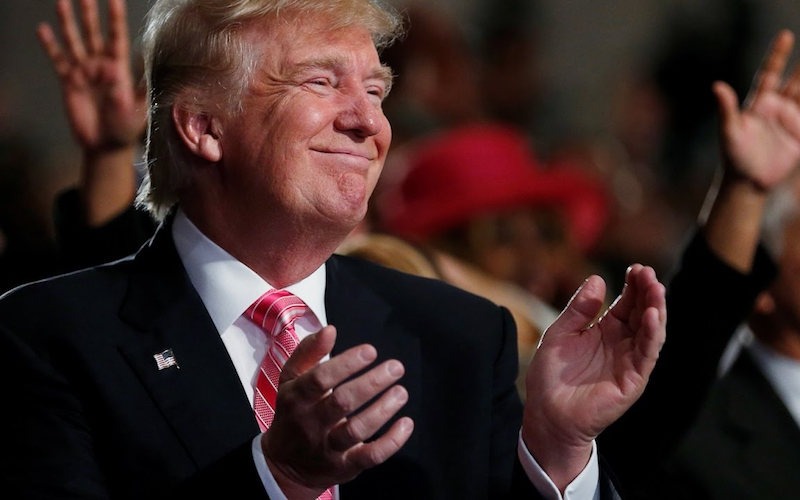
What did Trump’s Inaugural Address say on Foreign Policy?
In his inaugural address on 20th January 2017, U.S. President Donald Trump offered an unequivocal preview of his intended foreign policy. The 45th U.S. President covered issues of security, U.S. engagement with the world and trade. Negating any hopes of a softer tone as President, he framed all of these issues in starkly ‘America First’ terms.
Though broad in scope, inaugural addresses can presage the specifics of Presidential action. President Obama, for example, pledged to “work tirelessly” against climate change in his 2009 inaugural address, foretelling U.S. leadership and funds to address the issue. Donald Trump did not even mention climate change in his address – a notable absence that was swiftly followed by the removal of all references to climate change on the White House website.
On issues that he did address, President Trump signaled an unprecedented push for a nationalist foreign policy. Tellingly, he focused less on peace and security than did President Obama in his 2009 inaugural address, and far more on the U.S. in the global economy. He gave roughly equal airtime to considering America’s engagement in the world but in a far more isolationist tone.
Renewing hard power, and pursuing new alliances
On security, President Trump reinforced earlier indications that he aims to expend significantly more on U.S. hard power. He lamented the “very sad depletion” of the U.S. military (which is still easily the world’s strongest) and referred twice to the “military.” By contrast, President Obama did not make any reference to the military and repeatedly invoked soft and normative power, including America’s “enduring convictions” and his belief in the world’s “common humanity.”
Remarkably, President Trump did not mention the word “peace” in his inaugural address, a term that President Obama used four times in his 2009 address. While his predecessor affirmed America’s “sturdy alliances,” Donald Trump pledged to “reinforce old alliances and form new ones.” Some have already interpreted this statement as pointing to closer relations with Russia, especially since the statement was immediately followed by a reference to “eliminating radical Islamic terrorism.”
In fact, both the 44th and 45th Presidents vowed to defeat global terror, but only President Trump designated it as “Islamic.” Barack Obama’s sole reference in his 2009 address to the Islamic world was a desire he expressed to “the Muslim world [for] a new way forward, based on mutual interest and mutual respect.” This difference underlines the far larger divergence between Trump’s and Obama’s views of the world and America’s engagement with it.
U.S. engagement – A call to “win,” but at what costs?
While President Trump declared that the U.S. seeks “friendship and goodwill with the nations of the world,” he did so without the magnanimity that usually accompanies such statements. He preceded the declaration by announcing that, “America will start winning again, winning like never before,” and immediately followed the expression of friendship by another that emphasized America’s right to put its “own interests first.”
The new President’s reference to America “winning” was both unusual and unsurprising. His predecessors (including Obama, George W. Bush and Bill Clinton) in their inaugural addresses referred to America leading. Trump’s different choice of word exemplifies his openly ‘realpolitik’ approach, which prioritizes outcome over process. A less salutary process does not undermine a ‘winner’ as much as a ‘leader,’ who is expected to at least formally uphold some unifying principles and values.
Donald Trump made no reference to any such values in his inaugural address. By contrast, President Obama asked global leaders to stop ‘silencing dissent’ and ‘unclench their fists.’ This was a continuation of President Bush (Jr.)’s call for the U.S. to “lead the cause of freedom,” which in turn echoed President Clinton’s description of the struggle for democracy and freedom as “America’s cause.”
Trump’s break in precedent in affirming ‘American’ values – irrespective of the fierce and understandable criticism about implementation of these values – signals a readiness to dispense with soft power, a prized instrument of U.S. foreign policy that other nations like China and Germany can pick up and play – even if they may not be fully ready to do so.
America’s risky “new deal”
While President Trump’s renunciation of soft power presents opportunities for other global players, his economic agenda presents both challenges and opportunities. For those hoping for a softening of anti-free trade rhetoric in the inaugural address, there was none on offer. The new President used the language of protection multiple times (7 to be exact) and with combative zeal, stating that the U.S. “must protect [its] borders from the ravages of other countries making our products, stealing our companies, and destroying our jobs.”
Notably, neither Obama nor Bush (Jr.) even mentioned trade in their addresses, while Clinton implicitly affirmed it, by citing a need for the U.S. “to compete for every opportunity.” Trump’s protectionist rhetoric has been widely disparaged, including by those who have praised other parts of his economic plan. Nevertheless, it offers a silver lining for other countries – in the form of greater opportunity, impetus and flexibility to pursue their own multilateral agendas – including China with the planned Regional Comprehensive Economic Partnership (RCEP).
The Inaugural Address – An initial but uncertain footprint
Taken as a whole, President Trump’s inaugural address unambiguously reiterated his earlier statements on foreign policy. He vowed to end what mainstream U.S. politics regards as American leadership in the world – but which Trump has depicted as American folly in underwriting other countries’ needs and agendas, without extracting due reward or respect in return.
There are already a few initial signs of Donald Trump’s raw new deal for the world. These include removing references to climate change, on the new White House website and committing to withdrawing or negotiating key trade deals.
Ultimately, however, the extent to which he can pursue his intended foreign policy will depend on constraints that have beset other Presidents. These include the predictable behemoths of U.S. political institutions, and the unpredictability of global situations that are yet to unfold. Trump’s continuing refusal to release his tax returns heightens this unpredictability, by increasing the risk of unwelcome revelations of his links abroad. Perhaps most importantly now, the constraints also include the dexterity of others – both American and foreign – in their ability to outplay the ‘Apprentice President.’

